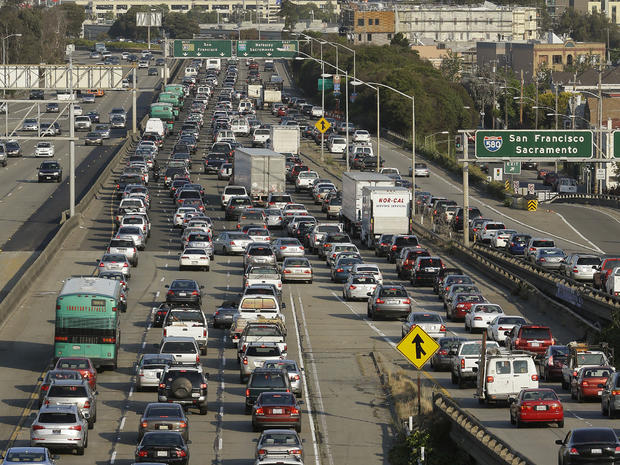San Fran Bay Area transit workers go on strike
Last Updated 12:56 p.m. ET
OAKLAND, Calif. San Francisco Bay area commuters got out the door earlier than usual Monday and encountered crowded roads and public transit after Bay Area Rapid Transit train workers went on strike.
Weekend talks between the unions and management failed to produce a new contract by Sunday's expiration date, halting train service for the first time in 16 years.
The walkout promised to derail the more than 400,000 riders who use the nation's fifth-largest rail system and affect every mode of transportation. Transportation officials said another 60,000 vehicles could be on the road, clogging highways and bridges throughout the Bay Area.
Traffic leading up to the toll plaza of the San Francisco-Oakland Bay Bridge was heavier than usual early Monday. People also lined up early to take buses that were leaving from a few Bay Area Rapid Transit stations.
Alameda-Contra Costa Transit buses into San Francisco were carrying more passengers, riders and bus drivers said.
"It's pretty crazy," said Young Choi, 34. "It's creating a pretty chaotic feeling in terms of the commute situation."
Choi, an architect at Skidmore, Owings & Merrill LLP in San Francisco's financial district, got dropped off by a friend in Berkeley from Walnut Creek around 6:30 a.m. Monday so he could catch the bus after hearing about the strike.
Normally, he'd leave later but was navigating a new route so he wanted to get an earlier start.
Still, early reports indicated a less chaotic morning commute than had been feared.
BART Strike Commuter Survival Guide (from KPIX)
The strike was called as Service Employees International Union Local 1021 and Amalgamated Transit Union Local 1555 workers' contracts expired at midnight Sunday. Both the unions and management earlier in the day had said they were far apart on key sticking points including salary, pensions, health care and safety.
"I'm deeply disappointed it has come to this," ATU Local President Antonette Bryant told reporters at a midnight news conference.
Negotiations fell apart Saturday and the unions walked away from the table. California Gov. Jerry Brown's office had urged both sides to resume discussions Sunday with rush hour on the horizon.
But talks between the two sides came to an end Sunday night with BART accusing negotiators of walking away from the bargaining table, while the SEIU countered in a statement that management "threw in the towel."
"A strike is always the last resort and we have done everything in our power to avoid it," Josie Mooney, a lead negotiator for one of BART's two major unions, told CBS Station KPIX in an e-mail. "We are disappointed that BART's failure to bargain honestly and fairly means that hundreds of thousands of Bay Area commuters have to suffer."
The unions, which represent nearly 2,400 train operators, station agents, mechanics, maintenance workers and professional staff, were asking for a 5 percent annual raise over the next three years. BART said Saturday that train operators and station agents in the unions average about $71,000 in base salary and $11,000 in overtime annually. The workers also pay a flat $92 monthly fee for health insurance.
BART spokesman Rick Rice said BART had upped its original offer of a 4 percent pay rise over the next four years to 8 percent. The proposed salary increase is on top of a 1 percent raise employees were scheduled to receive Monday, Rice added.
The transit agency also said it offered to reduce the contribution employees would have to make to their pensions, and lower the costs of health care premiums they would have to pay.
But ATU Local President Antonette Bryant said Sunday that BART's latest proposal is not an actual pay increase, calling it "surface bargaining."
"Our members aren't interested in disrupting the Bay Area, but management has put us in a position where we have no choice," said Bryant.
BART's last strike lasted six days in 1997.
Other area transit agencies urged commuters to consider carpooling, taking buses or ferries, working from home and, if they must drive to work, leaving earlier or even later than usual.
San Francisco Mayor Ed Lee said the city will offer increased transportation options, including at the airport, and increase staff for traffic management. BART said it will let commuters use parking lots at their 33 stations free of charge for the purpose of carpooling.
